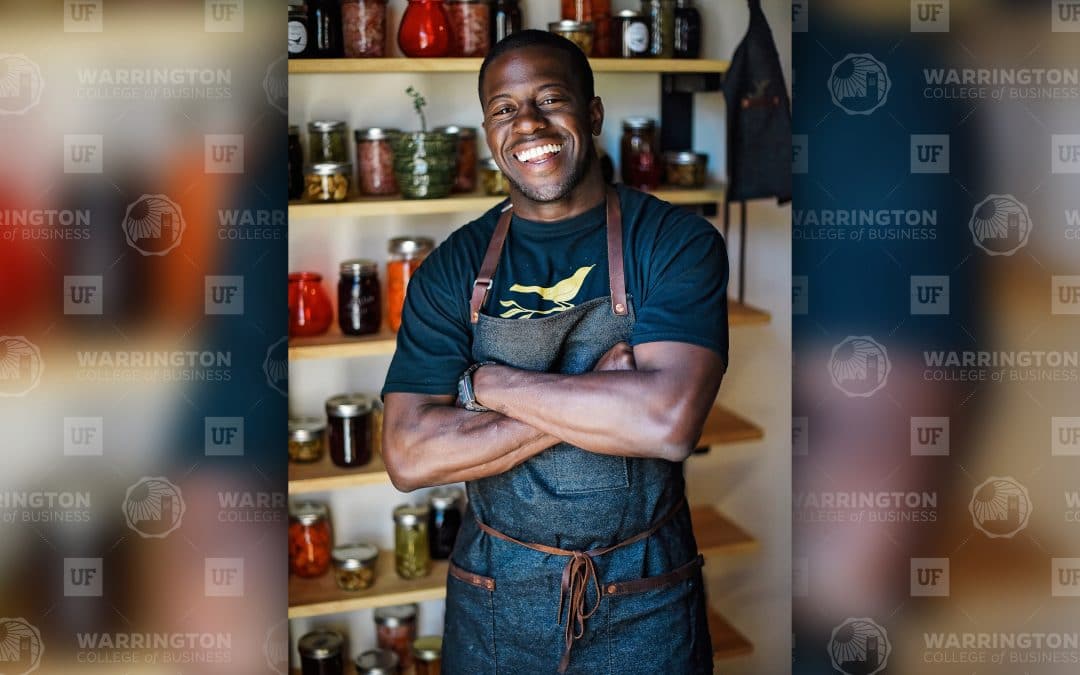Food with Roots
His Seattle eatery JuneBaby was named America’s Best New Restaurant. Two-time James Beard winner Edouardo Jordan got there by staying true to family and heritage.
This story originally appeared in the Fall 2020 issue of Florida Gator magazine.
“Groundbreaking.” “Authentic.” “Elegant.” “Enticing.” “Revolutionary.”
These are among the accolades lavished on Chef Edouardo Jordan’s award-winning cooking. But they apply equally to the UF alum and 40 Gators Under 40 honoree himself.
A native of St. Petersburg and chef/owner of three acclaimed Seattle restaurants, Jordan (BABA ’03, BSESS ’03) has dazzled the culinary world with his interpretations of American and Southern food – specifically, the dishes of his African American ancestors.
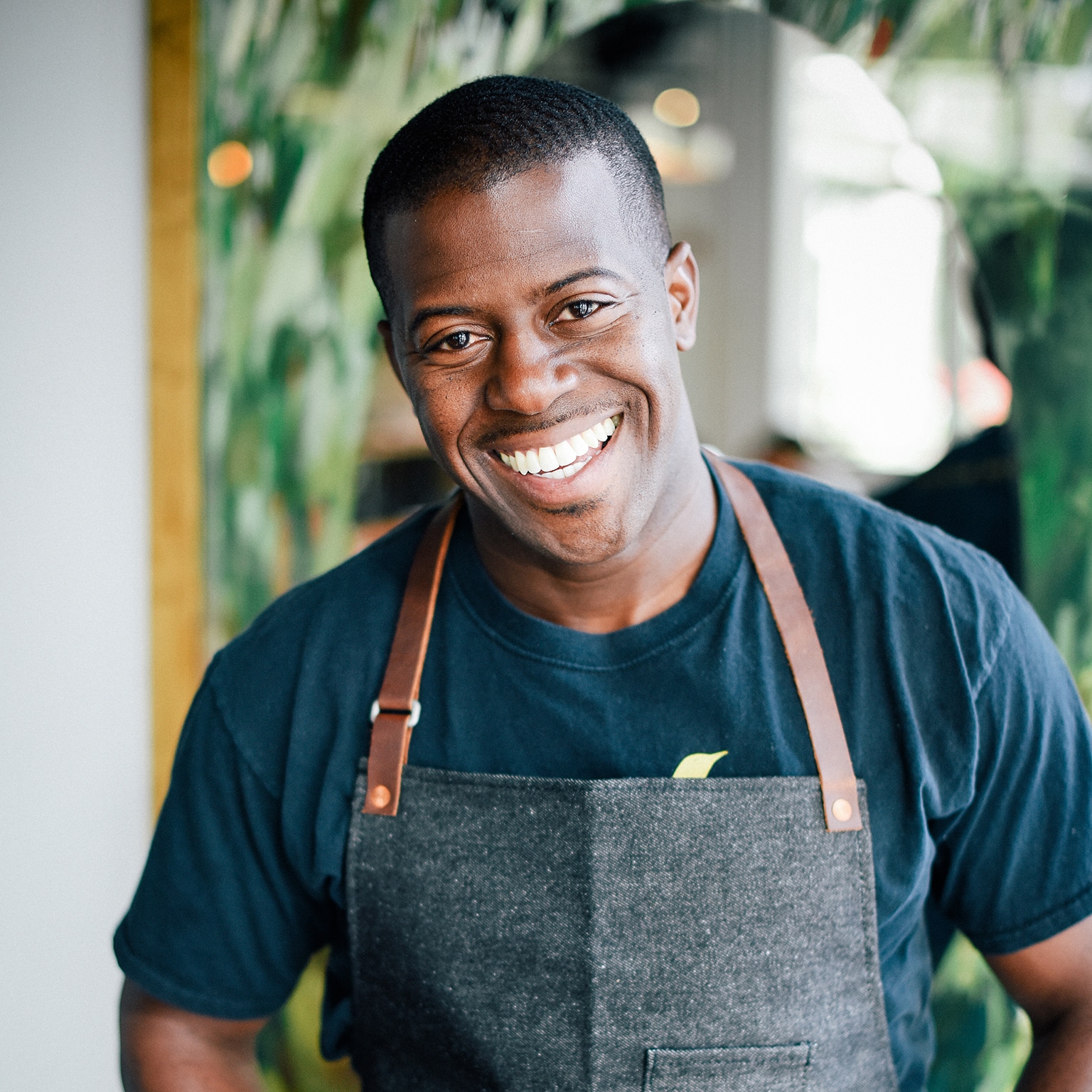
In 2020, Jordan was named among the 40 Gators Under 40. He was one of seven Warrington alumni on the list.
Salare, opened in 2015, drew raves for his delicious Southern fare tweaked with French and Italian influences, a nod to his impressive culinary training. But it was JuneBaby – his ode to Black Southern cooking — that put Jordan on the map.
In May 2018, Jordan won two James Beard Foundation awards — Best Chef Northwest (for Salare) and Best New Restaurant (for JuneBaby) – making him the first African American chef in the foundation’s 34-year history to take home the latter prize. As he stood onstage with his JuneBaby staff, a proud Jordan acknowledged that his historic win also belonged to the many great Black chefs who had come before him but whose fare never got its due.
“They’ve been pounding their knives against the walls and their cutting boards, and we finally cracked through,” he said.
Since then, Jordan, 40, has won a raft of culinary awards; opened a third restaurant, Lucinda’s Grainbar, in 2018; and launched his own retail line at Whole Foods in 2020, all while feeding displaced restaurant workers during the pandemic.
He even was a finalist in People magazine’s 2018 Sexiest Chef Alive competition.
While he credits his culinary prowess to both his familial and professional training, he said his success as a restauranteur reflects vital lessons learned at UF, where he earned dual bachelor’s degrees from the College of Health and Human Performance and the Warrington College of Business in 2003.
“I’m more than a chef, I’m a business person,” he said in a recent interview. “I think like a business person. Every step I take, I need to make sure I’m following through and asking questions – how will this impact my employees and me? Is it legal? Is it ethical? – before I go forward.
“UF made me a well-rounded person and gave me the broader understanding to make good decisions,” he said.
Hospitality, Heritage & Hard Work
Food was at the center of Jordan’s life growing up in St. Pete, whether it was Sunday dinners at the home of his paternal grandmother, Maggie Jordan, or helping his mother, Velda Jordan, put supper on the table. Both women sparked his love of cooking, in different ways.
“My grandma was all about hospitality and heritage,” he said. “We didn’t necessarily talk a lot about our history, but we gathered a lot about us through our foods.” The Georgia native’s specialties included Southern staples like fried chicken, chitlins, black-eyed peas and corn pudding, as well as snapping turtle and possum.
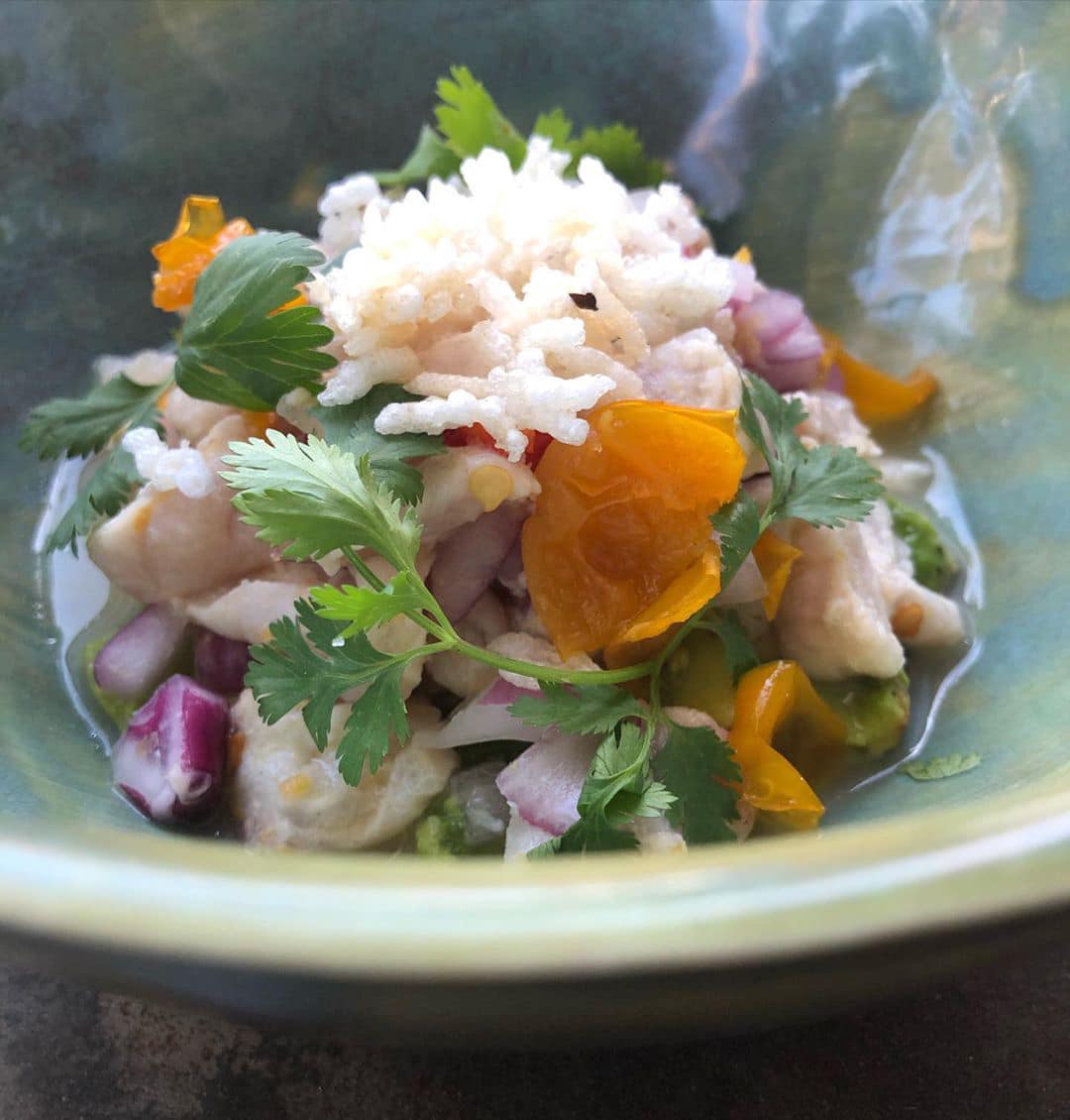
Jordan’s rockfish ceviche with Trinidad peppers, red onions, grilled California avocados, puffed rice and tiger water.
His mother, on the other hand, put him to work chopping vegetables after school. Only after he finished his kitchen duties could he go outside and play with the other kids.
Being conscripted as Momma Jordan’s sous-chef wasn’t something he relished at first, Jordan admitted, but it taught him a key lesson.
“I learned there’s things I have to be responsible for before I can get to the fun in life,” he said.
At age 9, Jordan proudly prepared his first meal all on his own – scrambled eggs, strawberry toast, bacon and OJ – for Momma Jordan on Mother’s Day.
“It wasn’t perfect,” he laughed, “but it was a start.”
By his middle school years, cooking had morphed from a chore to a pleasure. He doubled back to his grandmother’s kitchen where he pestered her with questions and pieced together recipes, some of which (Grandma’s Pound Cake, cornbread) are now on the JuneBaby menu.
Above all, his grandmother passed on the gift of balancing flavors.
“Grandma, she just knew how to season her food—that was from the start,” Jordan told Wine Spectator. “So maybe that’s innate in me.”
“Carving” New Gator Tracks
An excellent student and talented athlete – he did track, football, cross country and wrestling in high school – Jordan received scholarships to University of Miami, Drake University and Tulane. However, touring the University of Florida campus in 1998 made a deep impression on him.
“I fell in love with the campus and the experience there,” he said.
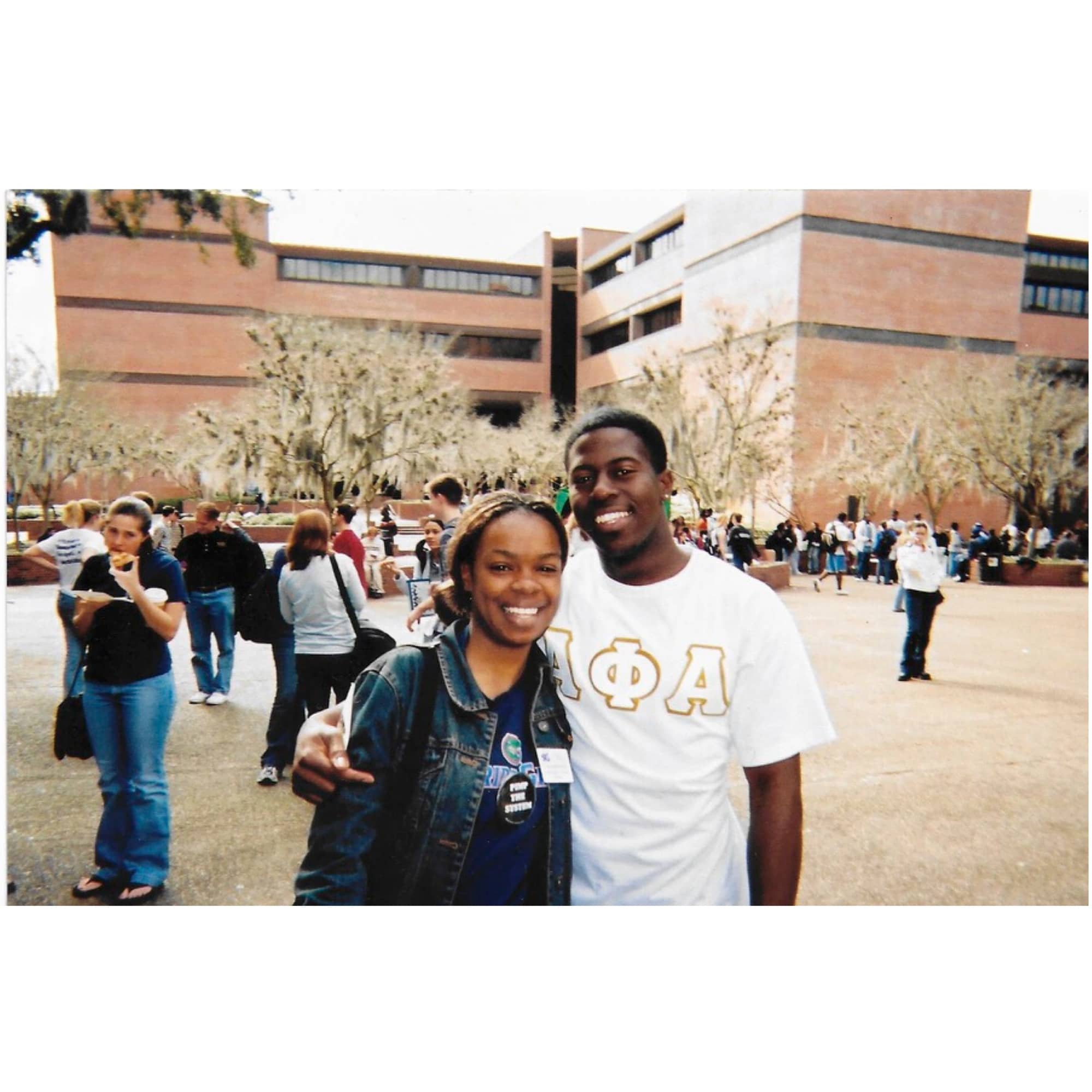
In his UF days, Jordan posed for this photo in Turlington Plaza with his friend Lydia Washington (BA ’06), who became student body Vice President.
Jordan also felt ready to take on the challenge of being a minority student on a mainly white campus. Once he was accepted to UF, he joined the Black Student Union and the PAACT (Pledging to Advance Academic Capacity Together) Program, an initiative, through Black Affairs, for diverse first-year students.
Nearly 7% of UF’s undergraduate student population was Black during Jordan’s freshman year, according to federal IPEDS Graduation Rate Survey data.
Being one of 40 PAACT Peers and having the support of key figures at the Dean of Students Office gave him the confidence to grow and “carve a new way” for himself on campus, he explained.
“UF, for me, was a realization of what society is,” he said. “It was quite important that I experienced another side of the world that I wasn’t part of before since I come from an African American community.”
With the aim of becoming a sports agent, Jordan worked toward double degrees in business administration and sports management. Just as he had applied himself to chopping onions and carrots in his mother’s kitchen, Jordan pulled plenty of all-nighters to reach his goal in four and a half years.
“Yeah, it was crazy of me, but that’s just like my love and desire,” he said. “I had an affinity for nutrition and science and food. But I also wanted to study business because I wanted to run my own business one day.”
In his free time, he ran an unassuming food blog, the now-defunct Tamburg.com.
He particularly remembers his first business law class. It was “hard as heck,” he said, but it taught him to consider the ethical, legal and moral implications of any choice before making a decision. He still relies on that process.
“I was grateful for that,” he said. “It’s automatic in me now.”
Honing His Culinary Chops
After graduating from UF in 2003, Jordan accepted an internship with the Tampa Bay Rays, his hometown baseball team. It should have been a dream job for the budding Jerry McGuire, but something was missing.
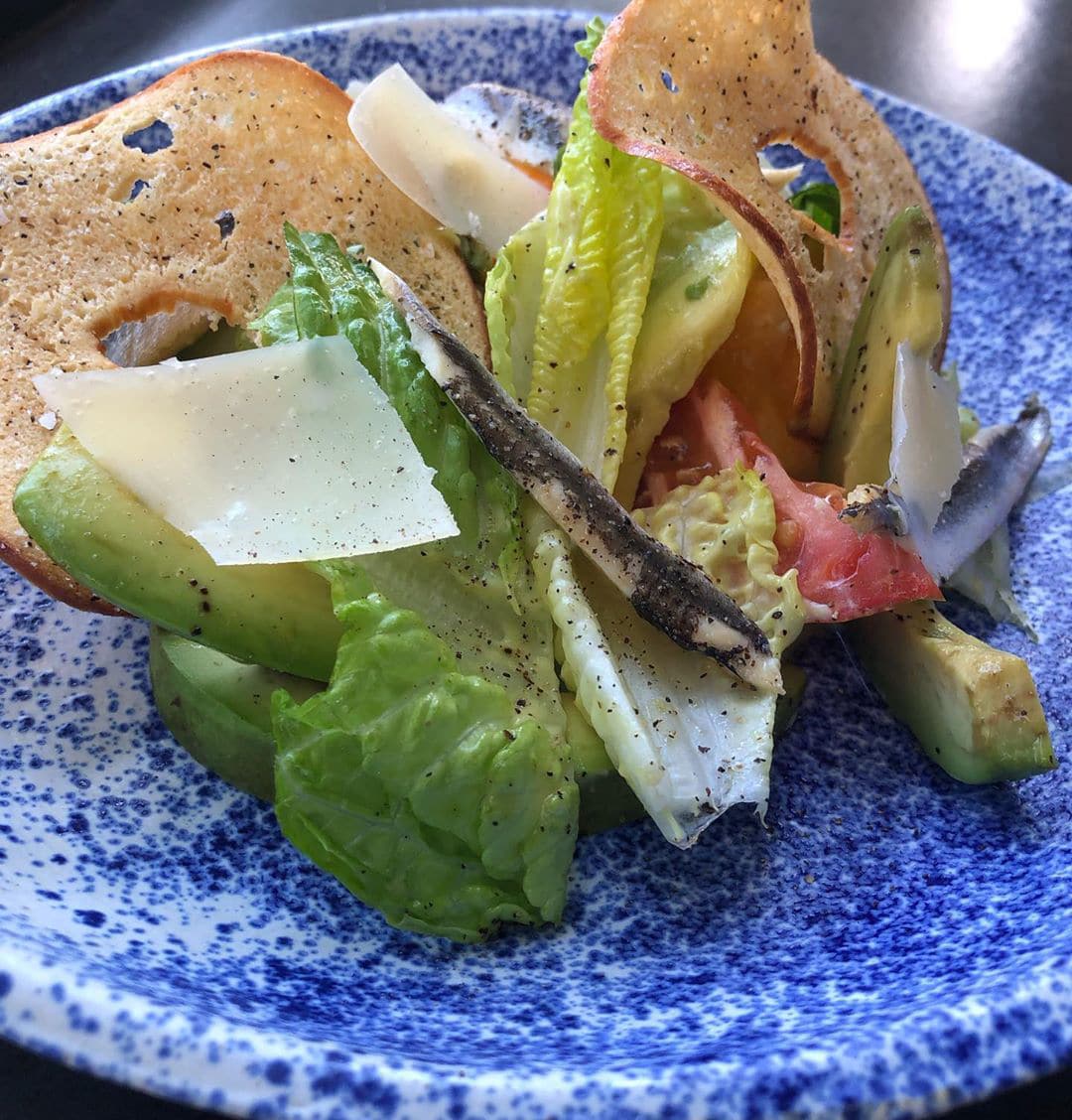
Jordan’s California Avocado Caesar with tomatoes, romaine lettuce, anchovies, parmesan and bagel croutons.
“I wasn’t having fun and had food in my heart and soul,” he admitted to Food & Wine magazine.
Jordan enrolled in Le Cordon Bleu College of Culinary Arts in Orlando, graduating with honors in 2005. Back in Tampa, he got a job cooking New American cuisine at one of the city’s finest restaurants. There, he dreamed of working at The French Laundry, in the Napa Valley, voted World’s Best Restaurant in 2003 and 2004 and the incubator for many great chefs.
Patient, yet determined, Jordan got his wish.
During his apprenticeship at the Laundry, he worked alongside butcher Mark Bodinet, a West Coast leader in the local-organic movement. Jordan next traveled to New York City, where he cooked at the Michelin-starred Per Se under Chef Jonathan Benno, whose leadership taught him how to manage a team under pressure.
Jordan’s quest for knowledge even took him to Parma, Italy, where he lived and studied with a family of ninth-generation salumi- (cured meat) and pasta-makers. There he encountered the Italian verb salare, which means to use salt to season, preserve or cure meats.
Salare would become the name of his first restaurant, in Seattle. It references both his Italian training and the longstanding Southern tradition of pickling and curing food.
A Star (Chef) is Born
So how did this Floridian chef – trained in California, New York and Italy – end up in Washington State?
“Well, I was chasing love and making everybody happy!” said Jordan, referring to his love interest at the time (now his ex-wife). The woman who beguiled Jordan was a Seattle native, and so he pulled up roots yet again and settled in the Northwest, with an eye on starting both a business and a family. Their son, Akil, was born in 2014.
Seattle had a burgeoning restaurant scene and farm-to-table movement. And the moment was right for a daring, entrepreneurial chef like Jordan to venture out on his own.
Financed with help from a Kickstarter campaign and opened in June 2015, Salare was a winner out of the box. Everything – from cured meats to pickles – is made from scratch, and diners went crazy over his homemade pastas, artisanal Nocino walnut liquor (made with a recipe bestowed by his Parma family) and monthly menus showcasing foods of the African diaspora. Food & Wine named him among the Best New Chefs of 2016.
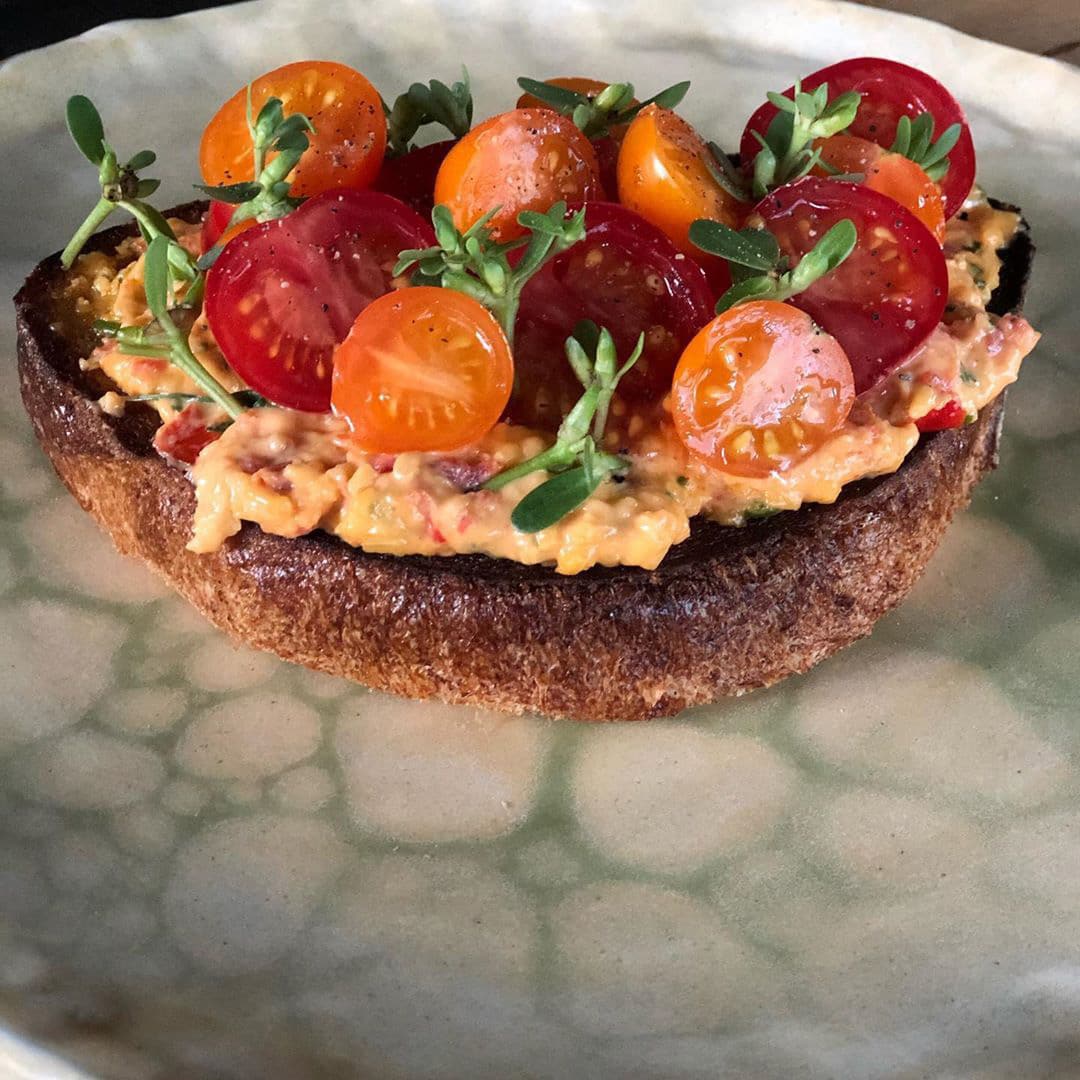
Toast with heirloom tomatoes and purslane with Jordan’s signature pimento cheese.
Jordan’s next venture, JuneBaby, debuted in spring 2017. Named for his father’s childhood moniker, the restaurant is deeply personal, serving up recipes gleaned from Maggie and Velda Jordan, reflected through the lens of the Northwest and Jordan’s wide-ranging culinary training.
Like many of the South’s great restaurants, JuneBaby relies on superior ingredients to elevate traditional Southern dishes like pulled pork shoulder, fried chicken and seafood jambalaya, but the eatery goes one further: it also showcases humble dishes passed down by generations of Black cooks that are never seen on fine dining menus — stewed pigs’ ears, oxtails, chitlins and boiled peanuts, for example – given more nuanced flavors and textures.
The mouthwatering results have opened diners’ eyes to the diversity and sustainability of Southern cooking and prompted the New York Times’ food critic to award JuneBaby a rare 3-star (Excellent) rating in March 2018. Two months later came Jordan’s unprecedented double James Beard win.
The rest, as they say, is history – which in JuneBaby’s case is documented in the restaurant’s online encyclopedia. The bespoke guide explains terms and concepts integral to Southern cooking – the good, the bad and the controversial — from Aunt Jemima to Po’ Boy to Yams (“most common African staple that fed enslaved Africans onboard ships”).
For Jordan, the joys of sharing his heritage on a plate have been a long time coming.
“When I opened Salare, I wanted to represent my journey as a professional chef,” he said. “That gave me the opportunity to open up JuneBaby with no clouds over me, no pressure to prove myself – it’s just me doing my thing. It’s natural to me, but I’m having fun doing it.”
“Dream Big, My Little Star”
Like most restaurant owners, Jordan was thrown for a loop when COVID-19 hit in March 2020. Ever resourceful, the Warrington graduate quickly pivoted JuneBaby to carry-out only. He also partnered with Seattle nonprofits to turn Salare into a community kitchen, serving hundreds of free to-go meals to laid-off restaurant workers each day. Since then, the kitchen has served more than 26,000 meals to those experiencing food insecurity.
Jordan admits profits are down, but he says staying afloat and helping others are the name of the game now.
“We’re still providing good food to our neighborhood as best we can and trying to be smart about surviving right now,” said Jordan. “The supportive community is definitely helping us get through this hard time.”
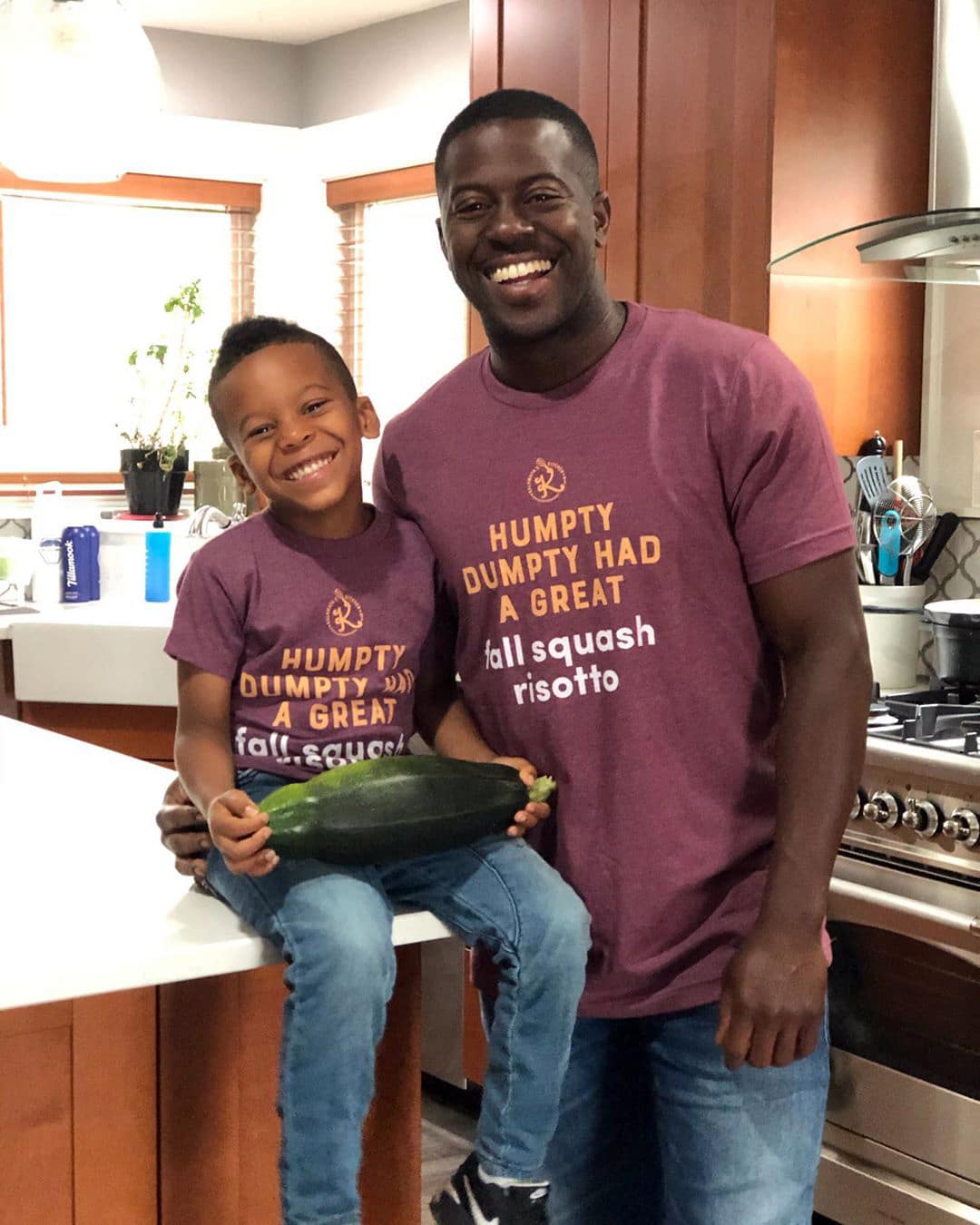
Follow Jordan, pictured here with his son, Akil, on Instagram (edouardojordan) to see posts about his latest culinary creatures.
There are some bright notes. One is his new retail food line, Food with Roots, which debuted in May 2020 in Seattle Whole Foods stores with Jordan’s popular pimento cheese spread. Other items will roll out soon as the line expands throughout Washington and Oregon.
“The retail process is a whole new world,” Jordan told Eater Seattle. “It’s about scalability and quality.”
Jordan is getting back to his roots with more than just pimento cheese. Recently, the affable chef helped the UF Alumni Association launch its online Gator Chef cooking video series, demonstrating a spicy watermelon salad with toasted feta from his Salare menu.
And, of course, there is Akil.
His six-year-old son is in first grade, and Jordan is savoring the day-to-day challenges of being a working parent. That includes letting Akil be part of his philanthropy efforts and activities in the kitchen.
Young Edouardo may have initially grumbled when Momma Jordan put a knife and a cutting board in his hand, but Akil appears to be an enthusiastic sous-chef. During the filming of the July 2020 Gator Chef episode, Akil cheerfully inspected the ingredients and sampled Dad’s finished creation, ending the session with a big Gator Chomp.
“He named his group at school ‘Golden Gators,’” said Jordan. “I think we have a future Gator here.”
Heritage is meant to be passed on. Jordan said it best in his acceptance speech for Best New Restaurant at the 2018 James Beard Awards. After thanking his mother, he dedicated the prize to Akil.
“I want you to dream big, my little star,” he said on stage. “We’re making history tonight, and Daddy wants you to know that if you can dream it, you can achieve it.
“The future is yours, but don’t forget the past.”
More about Edouardo Jordan
- Follow Jordan on Instagram.
- Read the May 2020 HHP story, “SPM Alum and Chef Edouardo Jordan Aids Restaurant Workers Impacted by Pandemic”.
- Donate to the Restaurant Worlds Relief Program to help Salare and other businesses feed displaced restaurant workers.


